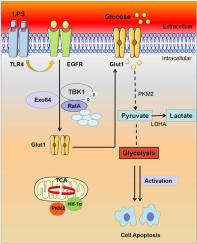Journal of Advanced Research ( IF 10.7 ) Pub Date : 2022-05-01 , DOI: 10.1016/j.jare.2022.04.010 Li Huang 1 , Xuedi Zhang 1 , Junyu Fan 2 , Xiaolei Liu 1 , Shuhua Luo 1 , Dianqing Cao 1 , Youtan Liu 3 , Zhengyuan Xia 1 , Hanhui Zhong 1 , Cuiping Chen 1 , Liangqing Zhang 1 , Zhifeng Liu 4 , Jing Tang 1

|
Introduction
Sepsis-induced apoptosis leads to lymphopenia including the decrease of CD4+ T cells thus favoring immunosuppression.
Objectives
Although epidermal growth factor receptor (EGFR) inhibitors significantly improve the survival rate of septic mice, the effect of EGFR on the function and metabolism of CD4+ T cells in sepsis remained unknown.
Methods
CD4+ T cells from septic mice and patients were assessed for apoptosis, activation, Warburg metabolism and glucose transporter 1 (Glut1) expression with or without the interference of EGFR activation.
Results
EGFR facilitates CD4+ T cell activation and apoptosis through Glut1, which is a key enzyme that controls glycolysis in T cells. EGFR, TANK binding kinase 1 (TBK1) and Glut1 form a complex to facilitate Glut1 transportation from cytoplasm to cell surface. Both the levels of membrane expression of EGFR and Glut1 and the activation levels of CD4+ T cells were significantly higher in patients with sepsis as compared with healthy subjects.
Conclusion
Our data demonstrated that through its downstream TBK1/Exo84/RalA protein system, EGFR regulates Glut1 transporting to the cell surface, which is a key step for inducing the Warburg effect and the subsequent cellular activation and apoptosis of CD4+ T lymphocytes and may eventually affect the immune functional status, causing immune cell exhaustion in sepsis.
中文翻译:

脓毒症中EGFR通过TBK1/Glut1诱导的Warburg效应促进CD4+T淋巴细胞凋亡
介绍
脓毒症诱导的细胞凋亡导致淋巴细胞减少,包括 CD4 + T 细胞减少,从而有利于免疫抑制。
目标
尽管表皮生长因子受体(EGFR)抑制剂显着提高了脓毒症小鼠的存活率,但EGFR对脓毒症CD4+ T细胞功能和代谢的影响仍不清楚。
方法
评估来自脓毒症小鼠和患者的CD4 + T 细胞的凋亡、活化、Warburg 代谢和葡萄糖转运蛋白 1 (Glut1) 表达,有或没有 EGFR 激活的干扰。
结果
EGFR 通过 Glut1 促进 CD4 + T 细胞活化和凋亡,Glut1 是控制 T 细胞糖酵解的关键酶。EGFR、TANK 结合激酶 1 (TBK1) 和 Glut1 形成复合物以促进 Glut1 从细胞质转运到细胞表面。与健康受试者相比,脓毒症患者的 EGFR 和 Glut1 膜表达水平以及 CD4 + T 细胞的活化水平均显着更高。
结论
我们的数据表明,通过其下游的 TBK1/Exo84/RalA 蛋白系统,EGFR 调节 Glut1 转运至细胞表面,这是诱导 Warburg 效应以及随后细胞活化和 CD4 + T 淋巴细胞凋亡的关键步骤,并可能最终影响免疫功能状态,导致败血症中的免疫细胞耗竭。



























 京公网安备 11010802027423号
京公网安备 11010802027423号